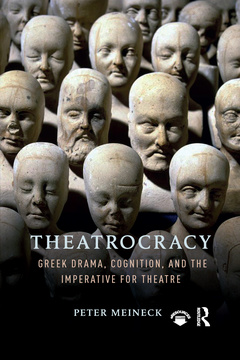Theatrocracy Greek Drama, Cognition, and the Imperative for Theatre
Auteur : Meineck Peter

Theatrocracy is a book about the power of the theatre, how it can affect the people who experience it, and the societies within which it is embedded. It takes as its model the earliest theatrical form we possess complete plays from, the classical Greek theatre of the fifth century BCE, and offers a new approach to understanding how ancient drama operated in performance and became such an influential social, cultural, and political force, inspiring and being influenced by revolutionary developments in political engagement and citizen discourse. Key performative elements of Greek theatre are analyzed from the perspective of the cognitive sciences as embodied, live, enacted events, with new approaches to narrative, space, masks, movement, music, words, emotions, and empathy. This groundbreaking study combines research from the fields of the affective sciences ? the study of human emotions ? including cognitive theory, neuroscience, psychology, artificial intelligence, psychiatry, and cognitive archaeology, with classical, theatre, and performance studies.
This book revisits what Plato found so unsettling about drama ? its ability to produce a theatrocracy, a "government" of spectators ? and argues that this was not a negative but an essential element of Athenian theatre. It shows that Athenian drama provided a place of alterity where audiences were exposed to different viewpoints and radical perspectives. This perspective was, and is, vital in a freethinking democratic society where people are expected to vote on matters of state. In order to achieve this goal, the theatre offered a dissociative and absorbing experience that enhanced emotionality, deepened understanding, and promoted empathy. There was, and still is, an urgent imperative for theatre.
Acknowledgements
Introduction: theatre as mimetic mind
Chapter 1 – Muthos: probability and prediction
Chapter 2 – Opsis: the embodied view
Chapter 3 – Ethos: the character of catharsis
Chapter 4 – Dianoia: intention in action
Chapter 5 – Melos: music and the mind
Chapter 6 – Lexis: somatosensory words
Chapter 7 – Metabasis: dissociation and democracy
Index
Peter Meineck is Professor of Classics in the Modern World at New York University, USA. He founded Aquila Theatre in 1991 and has since produced and directed more than 50 professional classical theatre works. He has also directed several National Endowment for the Humanities classics-based public programs, including the Chairman’s Special Award-winning Ancient Greeks/Modern Lives and The Warrior Chorus national veteran’s program. He has written widely on ancient theatre and its reception, and has published several translations of Greek drama.
Date de parution : 08-2020
15.6x23.4 cm
Date de parution : 06-2017
15.6x23.4 cm
Thèmes de Theatrocracy :
Mots-clés :
Left Posterior Superior Temporal Sulcus; Attic Red Figure Krater; Greek theatre; Markov Blanket; Greek drama; Fusiform Face Area; Greek tragedy; Brain’s Default Mode Network; Theatre and cognition; Theatre and cognitive neuroscience; Dionysos Eleuthereus; fMRI; Cognitive Absorption; Athenian drama; Kinesthetic Empathy; Athenian theatre; Pronomos Vase; Mimesis; Aquila Theatre; mirroring; Peripersonal Space; Mirror Neuron System; Prediction Error Correction; catharsis; City Dionysia; dramatic mask; Generative Predictive Model; tragic mask; Greek Mask; comic mask; satyr mask; Evaluative Conditioning; cognitive theory; Musical Expectancy; cognitive classics; Extrapersonal Space; classics and cognition; Human Mirror Neuron System; classics and cognitive theory; Noh Mask; peripeteia; Young Men; harmatia; Pre-motor Areas; anagnorisis; Anterior Insular Cortex; Predictive Processing



